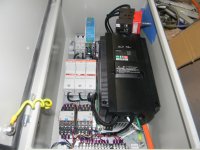I am looking at rewiring the motor on my Monarch model 61 13x30 lathe from 480V to 240V, and there is no motor tag on the motor or anywhere inside the motor access door. Luckily, the wires were labeled though (maybe by the last electrician that touched the motor ... as you can see in one of the pictures below, a blue service tag is attached to the motor).
You can see in one of my pictures below my notes on how the motor is connected to the lathe electronics enclosure. The connections appear to math the 'High Voltage' diagram here:
To rewire the motor itself is the easy part for me; I can just rewire it per the 'Low Voltage' diagram linked above, right?
Now, to rewire the cabinet and the square D safety switch (a picture of both is linked below) is where I am stuck.
Inside the cabinet at the bottom there is a control transformer with a red tag, it is currently wired for 480V out as you can see by the jumper between the screws at the top. That's simple enough, I can just jumper it per the diagram on the red tag for 240V. My question is, what else do I need to do in this lower cabinet and also at the square D safety switch at the top?
I will of course be running the machine from 240V single phase at the wall via a VFD to 3 phase 240V.
A bunch of pictures here:
You can see in one of my pictures below my notes on how the motor is connected to the lathe electronics enclosure. The connections appear to math the 'High Voltage' diagram here:
To rewire the motor itself is the easy part for me; I can just rewire it per the 'Low Voltage' diagram linked above, right?
Now, to rewire the cabinet and the square D safety switch (a picture of both is linked below) is where I am stuck.
Inside the cabinet at the bottom there is a control transformer with a red tag, it is currently wired for 480V out as you can see by the jumper between the screws at the top. That's simple enough, I can just jumper it per the diagram on the red tag for 240V. My question is, what else do I need to do in this lower cabinet and also at the square D safety switch at the top?
I will of course be running the machine from 240V single phase at the wall via a VFD to 3 phase 240V.
A bunch of pictures here:





